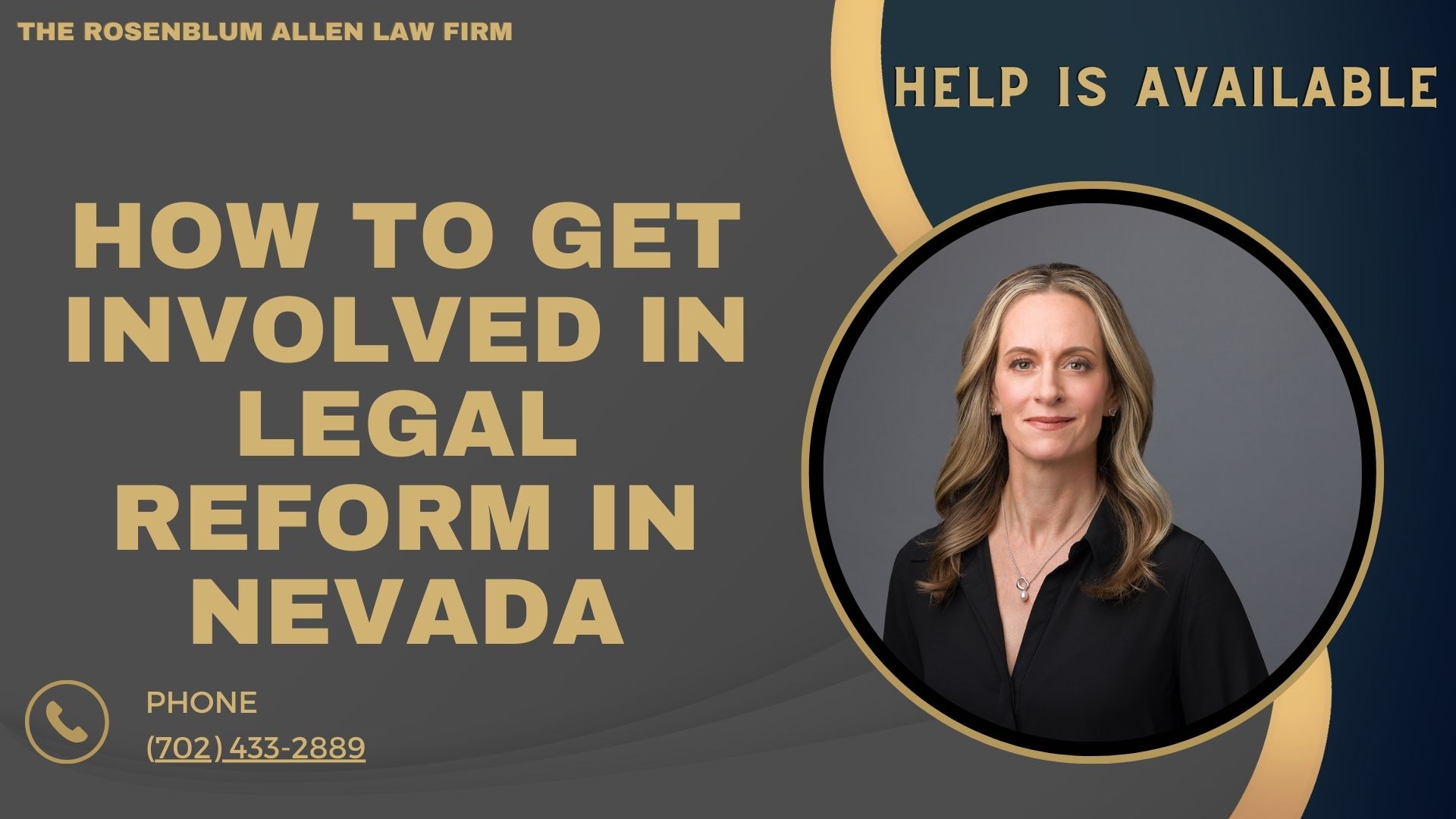Legal reform ensures that laws and the justice system evolve to meet society’s needs. In Nevada, legal reform efforts aim to address outdated regulations, improve fairness, and tackle pressing issues in the legal landscape. However, meaningful change doesn’t happen in isolation—it requires the involvement of everyday people like you.
This guide is designed to help you navigate how to get involved in legal reform in Nevada. From joining advocacy groups to engaging with lawmakers, there are numerous ways to make your voice heard and contribute to impactful changes.
Understanding Legal Reform in Nevada
What is Legal Reform?
Legal reform refers to reviewing, amending, or creating laws to improve justice and reflect societal values. It encompasses various activities, from altering specific legal practices to pushing for new regulations.
Why Legal Reform Matters in Nevada
Legal reform matters because laws must keep pace with changes in society. Here’s why it’s crucial:
- Addressing Outdated Laws: Some laws were written decades ago and may no longer be relevant or fair.
- Improving the Justice System: Legal reform can address issues like sentencing disparities or access to justice for underrepresented communities.
Current Legal Reform Movements in Nevada
There are several ongoing legal reform efforts in Nevada, each focused on a particular aspect of the legal system:
- Criminal Justice Reform: Efforts to reduce sentencing for non-violent crimes and improve rehabilitation opportunities.
- Bail Reform: Initiatives to change the bail system, making it less punitive for low-income individuals.
- Voter Rights Protection: Ensuring fair access to voting, including for previously disenfranchised populations.
Staying informed about these movements helps you better understand where your involvement can significantly impact.

Ways to Get Involved in Legal Reform
Join Advocacy Groups and Organizations
One of the most effective ways to get involved in legal reform is by joining advocacy groups already working on the issues you care about.
How to Join and Participate
- Become a Member: Many organizations offer memberships that give you access to events and resources.
- Volunteer: Volunteering your time can have a significant impact, whether it’s helping at events or assisting with campaigns.
- Donate: Financial contributions support advocacy efforts and help fund legal challenges and public awareness campaigns.
Attend Public Hearings and Town Halls
Finding Public Hearings Related to Legal Reform
Public hearings and town halls are great ways to get involved and make your voice heard. Many legislative processes include public comment periods where you can express your views directly to lawmakers.
- Nevada Legislature Website: This is a primary resource for finding upcoming hearings and meetings.
- Local Government Websites: City and county websites also list public hearings that may be relevant to local legal reform efforts.
How to Participate Effectively
- Prepare Your Comments: Be concise and focus on key points that highlight your concerns or support for the issue.
- Follow Meeting Etiquette: Respectful and well-prepared comments have a better chance of making an impact.
- Engage with Others: Connect with like-minded individuals at these events to expand your network and strengthen your advocacy.
This article provides a detailed roadmap for anyone interested in legal reform in Nevada, empowering you with the knowledge and tools to make a meaningful difference.
Engaging with Lawmakers
Contact Your Representatives
Reaching out to your local representatives is a powerful way to influence legal reform. Your voice matters, and lawmakers are there to represent you. Here’s how you can make your opinions count:
- Identify Your Local Representatives: Use resources like the Nevada Legislature website or standard tools like Google to find who represents your district.
- Effective Ways to Communicate:
- Phone Calls: Quick and direct. Outline your points clearly. Be polite and concise.
- Emails: Great for detailing your concerns. Personalize your message rather than using templates.
- Letters: Traditional but impactful. Handwritten letters can sometimes carry more weight.
Lobby for Change
Lobbying might sound daunting, but it’s just a fancy word for advocating directly with lawmakers. Here’s how to get started:
- How to Get Started with Lobbying:
- Research the Issue: Understand the legislation or policy you want to change.
- Prepare Your Case: Develop clear arguments and gather supporting evidence.
- Schedule a Meeting: Contact your representative’s office to schedule a time. Be respectful of their schedule.
- Tips for Meeting with Lawmakers:
- Be Concise: Time is limited. Stick to your key points.
- Be Honest: Don’t exaggerate facts. Lawmakers value credible information.
- Follow Up: Send a thank-you note or email summarizing your discussion and reiterating your points.

Using the Power of Your Voice
Social Media Advocacy
Social media is a game-changer for legal reform advocacy. It’s fast, far-reaching, and cost-effective. Here’s how to use it to your advantage:
- Utilizing Social Media to Promote Legal Reform:
- Share News and Updates: Post relevant articles, news, and reform updates on platforms like Twitter, Facebook, and Instagram.
- Join Conversations: Use hashtags related to legal reform, such as #NevadaLegalReform, to join ongoing discussions.
- Effective Campaign Strategies:
- Create Engaging Content: Use infographics, videos, and compelling stories to capture attention.
- Call to Action: Encourage your followers to take specific actions, like signing petitions or attending rallies.
- Collaborate with Influencers: Partner with local activists or influencers to amplify your message.
Writing Op-eds and Blogs
Expressing your views in writing is another impactful way to advocate for change. Well-crafted opinion pieces can influence public opinion and even catch the attention of lawmakers.
- How to Write Persuasive Pieces for Legal Reform:
- Choose a Specific Issue: Focus on one aspect of legal reform rather than broad topics.
- Use Personal Stories: Relate the issue to real-life examples. This makes your argument more relatable and persuasive.
- Include Facts and Statistics: Support your arguments with data to add credibility.
- Getting Your Work Published in Local Outlets:
- Submit to Newspapers: Local newspapers often accept opinion pieces on current issues.
- Use Online Platforms: Websites like Medium or LinkedIn allow you to publish articles that can reach a broad audience.
- Guest Blogging: Contact local advocacy websites or blogs to see if they accept guest posts.
Supporting Legal Reform Through Volunteering and Donations
Volunteer Opportunities in Nevada
Volunteering allows you to contribute directly to legal reform efforts. Your skills and time can support organizations pushing for change.
- Organizations That Need Volunteer Support:
- ACLU of Nevada: Offers roles ranging from event support to community outreach.
- Nevada Legal Services: Provides opportunities for volunteers to assist with legal aid.
- Nevada Coalition for Legal Reform: Needs volunteers for research, advocacy, and campaign work.
- Types of Volunteer Roles Available:
- Event Support: Help organize or staff events.
- Community Outreach: Educate the public about legal reform issues.
- Administrative Support: Assist with office tasks, research, and data entry.
Donate to Legal Reform Causes
Donating is another powerful way to support legal reform if you don’t have time to volunteer. Funds are crucial for advocacy, legal battles, and public education campaigns.
- Where Your Money Can Make a Difference:
- Legal Defense Funds: These funds help cover the costs of challenging unjust laws in court.
- Public Awareness Campaigns: Donations help run ads, create educational materials, and support outreach efforts.
- Non-Profit Organizations: Many advocacy groups rely on donations to run their operations.
- Understanding How Donations Are Used:
- Operational Costs: Keeping the lights on and paying staff who work tirelessly for reform.
- Legal Expenses: Covering the costs of filing lawsuits and legal research.
- Community Programs: Funding educational workshops, informational campaigns, and support services.

Educate Yourself and Others
Stay Informed About Nevada’s Legal System
Understanding the legal landscape is the first step toward meaningful involvement. Staying informed helps you advocate effectively and empowers you to educate others. Here’s how you can keep up:
- Critical Resources for Legal Education:
- Nevada Legislature Website: Updates bills, laws, and upcoming legal changes.
- Nevada Law Journal: An excellent resource for in-depth articles on current legal issues and reforms.
- Local News Outlets: Regularly check the legal sections of major Nevada newspapers, like the Las Vegas Review-Journal.
- Free Online Courses and Workshops:
- Coursera and edX: Offer free law, legal reform, and civic engagement courses.
- Webinars from Advocacy Groups: Organizations like the ACLU often host free webinars on relevant legal topics.
- University Public Lectures: Universities like UNLV host public lectures and events that cover Nevada-specific legal issues.
Host or Attend Educational Events
Educational events are perfect for spreading awareness and fostering community engagement. They create spaces where people can learn, discuss, and plan actions for legal reform.
- How to Organize Community Events:
- Choose a Focus Topic: Narrow down to a specific aspect of legal reform, like bail reform or voter rights.
- Find a Venue: Libraries, community centers, or virtual platforms like Zoom can host these events.
- Invite Professionals: Legal professionals, activists, or professors can provide valuable insights and drive the conversation.
- Benefits of Attending Educational Seminars:
- Learn from Professionals: Gain in-depth knowledge from people directly involved in reform efforts.
- Network with Like-minded Individuals: Meet others who share your passion and can support your advocacy.
- Stay Updated: Educational events often discuss the latest developments and upcoming reform opportunities.
Building a Network of Reform-Minded Individuals
Networking Tips for Legal Reform Activists
Building a network of like-minded individuals amplifies your efforts. It’s not just about who you know; it’s about working together toward common goals. Here are some practical ways to start:
- Building Connections in Advocacy Groups:
- Join Group Discussions: Attend meetings and engage actively in discussions.
- Volunteer for Tasks: Offer your skills where needed, whether organizing events or managing social media.
- Stay in Touch: Follow up with people you meet and find ways to collaborate.
- Attending Networking Events Focused on Legal Reform:
- Conferences and Summits: Look out for local events where activists, legal professionals, and lawmakers gather.
- Meetup Groups: Platforms like Meetup often have groups dedicated to activism and legal reform.
- Webinars and Virtual Networking: Online events are a great way to connect with people across Nevada and beyond.
Collaborating with Like-Minded Individuals
Collaboration makes legal reform efforts more robust and more effective. Working together can lead to innovative ideas and more impactful actions.
- Creating Local Reform Initiatives:
- Start a Community Group: Gather a small group of friends or neighbors to discuss local legal issues and possible actions.
- Petition Drives: Organize or participate in petitions that push for specific reforms.
- Public Awareness Campaigns: Create campaigns to educate the community, like hosting info booths or distributing flyers.
- Success Stories of Collaborative Efforts in Nevada:
- Bail Reform Advocacy: Grassroots groups have successfully pushed for changes in the bail system, leading to fairer practices.
- Voter Rights Expansions: Collaborative efforts by multiple organizations helped improve access to voting in marginalized communities.
- Community Legal Clinics: Local groups have partnered with legal aid organizations to provide free legal advice to those in need.

Breaking It All Down
Legal reform starts with you. Getting involved, staying informed, and connecting with others can play a critical role in shaping a fairer legal system in Nevada. Whether through direct advocacy, volunteering, or simply spreading the word, every action counts. Your involvement can inspire change and make a lasting impact on your community. So take the next step—Nevada’s future is in your hands.

Frequently Asked Questions
What are some critical legal reform issues currently being discussed in Nevada?
Key issues include criminal justice reform, bail reform, voter rights protection, and access to legal services. Each area focuses on making the legal system fairer and more accessible to all residents.
How can I find upcoming public hearings related to legal reform?
You can find information about upcoming public hearings on the Nevada Legislature website or by checking your local government’s website. These platforms provide schedules and details about hearings where you can voice your opinions on legal matters.
Is it necessary to have a legal background to get involved in legal reform?
You don’t need a legal background to participate in legal reform. Many organizations provide the resources and support necessary to help you get involved, no matter your level of expertise. Your perspective as a citizen is valuable.
What skills are helpful in volunteering in legal reform efforts?
Research, communication, event planning, and public speaking skills are precious. However, enthusiasm and a willingness to learn are just as important. Many organizations offer training for volunteers.
Can I make a difference if I don't have much time to commit?
Yes, even small actions like signing petitions, sharing information on social media, or attending a single event can make a difference. Every bit of involvement helps push the needle toward meaningful change.
What should I expect when meeting with a lawmaker?
Meetings with lawmakers are usually short, so it’s essential to be prepared. Expect to discuss your main points quickly and directly. Lawmakers appreciate when constituents are clear about their concerns and provide relevant facts.
How can I educate others about legal reform?
You can educate others by hosting informational events, sharing reliable resources, writing op-eds, or simply conversing with friends and family. Social media is also a powerful tool for reaching a broader audience.
What are some practical ways to collaborate with others interested in legal reform?
Effective collaboration can include organizing local events, participating in joint campaigns, or co-authoring advocacy letters. Networking through meetings, online forums, and community groups also helps build strong reform efforts.
Are there any costs associated with getting involved in legal reform?
While some activities, like attending events or joining specific organizations, may have costs, many ways to get involved are free. Volunteering, attending public hearings, and participating in social media advocacy are all cost-free ways to contribute.
How can I keep up with changes in Nevada's legal system?
Staying informed is easy with the right resources. Regularly check websites like the Nevada Legislature, follow relevant social media accounts, and subscribe to newsletters from advocacy groups to get updates on the latest legal reform efforts.
What's the best way to start if I'm new to legal reform advocacy?
Start by educating yourself on the issues you care about most. Join a local advocacy group, attend a meeting or webinar, and connect with others who share your interests. You don’t have to dive in all at once—small steps lead to more extensive involvement.
How does my involvement impact legal reform?
Your involvement amplifies the voices calling for change. Engaging with lawmakers, participating in public discussions, and supporting reform groups help build momentum that can lead to legislative and societal shifts. Your efforts contribute to the collective push for a better legal system.

Additional Resources for You from The Rosenblum Allen Law Firm.
In addition to helping with appeals, our lead attorney, Molly Rosenblum Allen, Esq., has created various resources to support you in other legal matters:
Criminal Defense Attorneys: Effective defense for a wide range of criminal charges to protect your rights and future.
Las Vegas DUI Lawyer: Specialized guidance and defense strategies for those facing DUI charges in Las Vegas.
Domestic Violence Lawyer Las Vegas: Compassionate and experienced legal support for domestic violence cases, focusing on protecting your rights.
Drug Possession Lawyer: Aggressive defense for drug possession charges to minimize the impact on your life.
Sex Crimes Attorney: Dedicated representation for sensitive and serious sex crime allegations.
CPS Defense Attorney: Defense against Child Protective Services actions, protecting your family and parental rights.
Misdemeanor Lawyer: Guidance through the legal process for misdemeanors, aiming for the best possible outcomes.
Las Vegas Warrant Defense Attorney: Help with clearing warrants and addressing related legal issues promptly and efficiently.
Las Vegas Probation Violation Attorney: Skilled defense for probation violations to help you avoid harsh penalties.
Theft Crime Defense Lawyer: Representation for theft charges, focusing on reducing charges or dismissing your case.
Kidnapping Lawyers: Effective legal defense for kidnapping charges, prioritizing your rights and freedom.
Juvenile Defense Lawyers: Protecting the rights of minors facing legal challenges, aiming for solutions that support their future.
Firearms Lawyer Las Vegas: Defense for firearm-related charges, ensuring your second amendment rights are upheld.
These resources are designed to provide you with the knowledge and support needed to navigate these challenging legal issues.

Offsite Resources for You
American Bar Association (ABA): https://www.americanbar.org/
The ABA provides extensive resources and information on the legal process, including articles and guides on appeals and other legal topics.
National Association of Criminal Defense Lawyers (NACDL): https://www.nacdl.org/
NACDL offers resources and advocacy for criminal defense attorneys and individuals facing criminal charges, including insights on appeals.
Nevada Judiciary: https://nvcourts.gov/
The official website of the Nevada Judiciary provides direct access to court information, forms, and procedures for appeals and other legal processes.
FindLaw: https://www.findlaw.com/
FindLaw offers a comprehensive collection of legal articles, case law, and guides on various legal topics, including the appeals process.
Justia: https://www.justia.com/
Justia provides free access to a wide range of legal information, including resources related to appeals and Nevada-specific legal issues.
Martindale-Hubbell: https://www.martindale.com/
Martindale-Hubbell offers lawyer directories and legal articles, helping individuals connect with qualified attorneys and learn more about the appeals process.
National Center for State Courts (NCSC): https://www.ncsc.org/
NCSC provides information on court systems, including appeals processes, court administration, and resources for those involved in legal proceedings.

A Special Message from Our Lead Attorney, Molly Rosenblum Allen, Esq

Thank you for taking the time to read through our resources. Navigating legal challenges, especially when you’re far from home, can be overwhelming, but you don’t have to go through it alone. If you need help with your situation or have any questions, please don’t hesitate to reach out. Give me and my team a call at (702) 433-2889, and let’s get the ball rolling. We’re here to support you every step of the way.
Looking forward to speaking with you soon!






